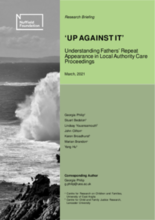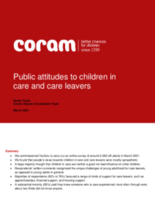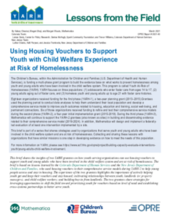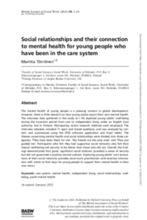Displaying 191 - 200 of 2221
This paper reports on a small-scale, qualitative evaluation of an approach to working with children in care launched in Brighton and Hove called Me and My World. Core principles of the model are explained including continuity of relationship between social workers and children in care; a statutory review process which promotes participation of the child and young person and a recording system where social workers, IRO’s and foster carers write reports for review directly to the child.
This article exploresthe extent to which general strain theory (GST) and self-control theory can explain the mental health outcomes of youth in-care.
This article explores population-level prevalence of Posttraumatic stress disorder for Young Children (PTSD-YC) to test whether application of Alternative Algorithm for PTSD (AA-PTSD) criteria, relative to the DSM-IV PTSD algorithm, increases identification of 5-6 year old children with clinical needs, in both the general population, and among looked-after-children where the risk of mental health issues is greater.
This mixed methods research project, involving twenty participating local authorities and eight voluntary organisations from a wide geographic spread across England, was carried out between 2017 and 2019. The study was designed to investigate fathers and their recurring appearance in care proceedings at a macro, meso and micro level, with each element collecting and analysing data for distinct but related research questions.
Coram, the UK’s first children’s charity, commissioned YouGov to carry out an online poll of 2,092 UK adults, who were asked questions regarding children in care and care leavers. YouGov provided a breakdown of responses by groups of respondents and Coram's own qualitative and quantitative analysis of the answers follows.
This brief is part of a series that shares strategies used by organizations that serve youth and young adults who have been involved in the child welfare system and are at risk of homelessness. It examines a multi-phase grant program to build the evidence base on what works to prevent homelessness among youth and young adults who have been involved in the child welfare system in the U.S.
The current study utilized survey data to determine if respondent characteristics and inter‐rater agreement on measures of important relationships were associated with resilience among child welfare‐involved youth.
The interview data gathered in this study explored young adults’ well-being during the transition period from care to independent living under an English local authority and in Finland.
This study addresses a gap in the literature regarding older youth with intellectual disabilities who are sexually victimized and pushed to engage in transactional sex while they are transitioning from child welfare systems involvement. It does so by examining risk and protective factors at the individual, micro, exo, and macro systems levels.
The overall aim of this article to gain updated knowledge on how children and youth who have received or are receiving child welfare (CW) interventions from the Nordic CWS fare in relation to suicidality.




